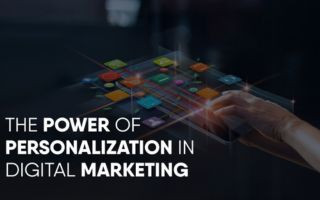In today’s fast-paced digital world, personalization has emerged as a game-changer in digital marketing. With consumers expecting tailored experiences and relevant content, businesses that leverage personalization strategies can significantly enhance their customer engagement and drive better results. This blog explores the importance of personalization in digital marketing, its benefits, and how to effectively implement personalized marketing strategies.
What is Personalization in Digital Marketing?
Personalization in digital marketing refers to the practice of tailoring marketing messages, content, and experiences to individual users based on their preferences, behaviors, and interactions. It involves using data-driven insights to deliver relevant and customized content that resonates with each user, making them feel valued and understood.
Why Personalization Matters
Enhanced Customer Experience
Relevance: Personalization ensures that users receive content and offers that are relevant to their interests and needs. This relevance enhances the overall customer experience, making interactions more engaging and meaningful.
Customer Satisfaction: By delivering personalized experiences, businesses can improve customer satisfaction and build stronger relationships. Customers are more likely to respond positively to brands that understand and cater to their preferences.
Increased Engagement and Conversion Rates
Higher Engagement: Personalized content and recommendations are more likely to capture users' attention. When users see content that aligns with their interests, they are more inclined to engage with it.
Improved Conversions: Personalization can lead to higher conversion rates. Targeted offers and recommendations can drive users to take desired actions, such as making a purchase, signing up for a newsletter, or downloading an app.
Better Customer Retention
Loyalty: Personalized experiences foster a sense of loyalty and trust. When customers feel valued and understood, they are more likely to return and engage with your brand repeatedly.
Reduced Churn: By addressing individual preferences and needs, businesses can reduce customer churn. Personalized follow-ups and offers can help retain customers and prevent them from switching to competitors.
Informed Decision-Making
Data-Driven Insights: Personalization relies on data and analytics to understand customer behavior and preferences. This data provides valuable insights that can inform marketing strategies and decision-making.
Predictive Analytics: Using historical data and predictive analytics, businesses can anticipate customer needs and deliver proactive, personalized experiences.
How to Implement Personalization in Digital Marketing
Collect and Analyze Customer Data
Data Sources: Gather data from various touchpoints, such as website interactions, social media engagement, email campaigns, and purchase history. Use this data to build detailed customer profiles.
Analytics Tools: Utilize analytics tools to analyze customer behavior and preferences. Tools like Google Analytics, CRM systems, and marketing automation platforms can provide insights into user patterns and trends.
Segment Your Audience
Behavioral Segmentation: Segment your audience based on their behavior, such as browsing history, purchase history, and engagement levels. This allows you to create targeted marketing campaigns for different segments.
Demographic Segmentation: Use demographic information, such as age, gender, location, and interests, to further refine your audience segments and tailor your messaging accordingly.
Create Personalized Content
Dynamic Content: Use dynamic content on your website and in your email campaigns to deliver personalized experiences. For example, show product recommendations based on users’ browsing history or previous purchases.
Tailored Messaging: Craft personalized messages that address individual needs and preferences. Use the customer’s name, reference their previous interactions, and offer relevant solutions or recommendations.
Leverage Personalization Technologies
Marketing Automation: Implement marketing automation platforms to streamline personalized marketing efforts. These platforms can help automate email campaigns, content delivery, and customer follow-ups based on user behavior.
AI and Machine Learning: Utilize artificial intelligence (AI) and machine learning to analyze large volumes of data and deliver personalized recommendations in real-time. These technologies can enhance the accuracy and effectiveness of your personalization efforts.
Optimize for Mobile
Mobile Personalization: Personalization should extend to mobile devices. Ensure that your mobile app and website deliver personalized experiences, such as location-based offers or personalized push notifications.
Responsive Design: Use responsive design to ensure that personalized content is optimized for different screen sizes and devices, providing a seamless experience across all platforms.
Monitor and Adjust Your Strategies
Track Performance: Continuously monitor the performance of your personalized marketing campaigns. Use metrics such as engagement rates, conversion rates, and customer feedback to assess the effectiveness of your strategies.
Iterate and Improve: Based on performance data, make adjustments to your personalization tactics. Experiment with different approaches and refine your strategies to achieve better results.
Examples of Successful Personalization
Amazon: Amazon excels in personalization by providing product recommendations based on users’ browsing and purchase history. Their “Recommended for You” section showcases products tailored to individual preferences.
Netflix: Netflix uses personalized recommendations to suggest shows and movies based on users’ viewing history and ratings. Their algorithm analyzes user behavior to deliver relevant content.
Spotify: Spotify offers personalized playlists and music recommendations based on users’ listening habits. Their “Discover Weekly” and “Release Radar” playlists provide tailored music suggestions.
Conclusion
Personalization is a powerful tool in digital marketing that can significantly enhance customer experience, increase engagement, and drive conversions. By leveraging data, segmenting your audience, and creating tailored content, businesses can deliver more relevant and meaningful interactions. Implementing personalization strategies requires ongoing analysis and adjustment, but the benefits of improved customer satisfaction, loyalty, and business growth make it a worthwhile investment. Embrace personalization in your digital marketing efforts to stay competitive and build lasting relationships with your audience.


